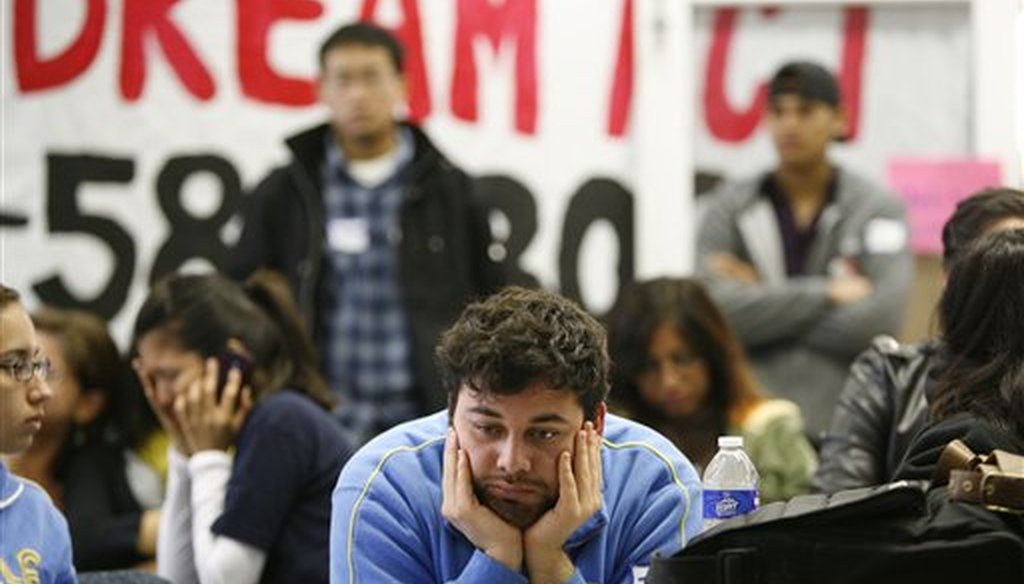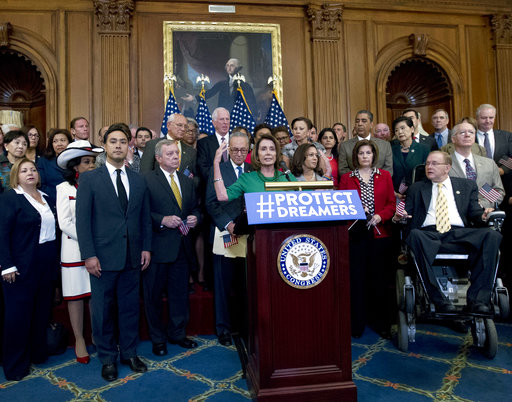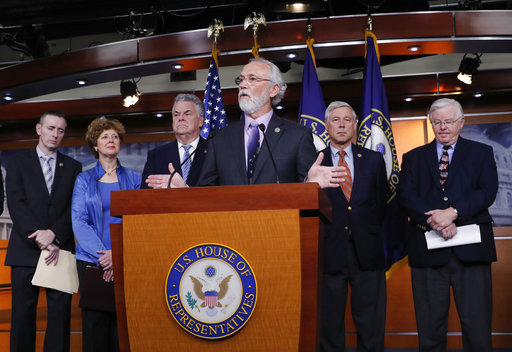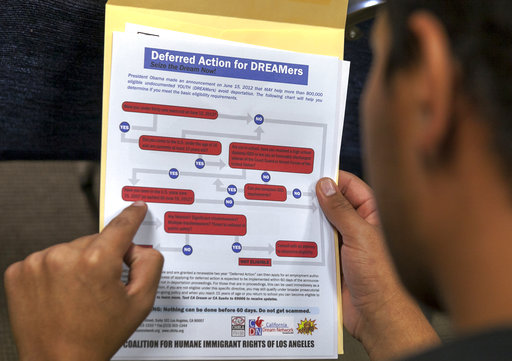Stand up for the facts!
Our only agenda is to publish the truth so you can be an informed participant in democracy.
We need your help.
I would like to contribute

In this 2010 file photo, UCLA student Jose Ortiz, 20, reacts as the Dream Act fails to move forward in the Senate during televised coverage of proceedings at the UCLA Downtown Labor Center in Los Angeles, Dec. 18, 2010. (AP/Jason Redmond)
If Your Time is short
-
Lawmakers have been trying to pass a version of the DREAM Act since at least 2001. Public opinion polls show majority support for Dreamers, immigrants here illegally who came to the United States as children.
-
Neither Democrats or Republicans have been willing to give in on other priorities that would grant Dreamers a lawful permanent status.
-
The U.S. Supreme Court ruled in June that the Trump administration did not follow the proper procedures to end DACA, an Obama-era program that protected eligible Dreamers from deportation. The administration can try again to revoke the program.
Politicians and the American public seem to agree that immigrants known as "Dreamers" should be given a chance to stay in the country permanently and legally.
For nearly two decades, Democrats and Republicans in Congress have crafted versions of legislation that would offer immigrants who came here as children a path to U.S. citizenship. Presidents of both parties have expressed support. Many polls show the majority of Americans support it, too.
But that bipartisan enthusiasm has not materialized into law. Why not?
Neither party is willing to concede its priorities.
Democrats generally favor a bill that addresses Dreamers without giving in to President Donald Trump’s priorities on immigration. Republicans do not want to extend an Obama-era program, which defers deportation, without achieving other goals such as a reduction in legal immigration or funding for a U.S.-Mexico border wall.
Sign up for PolitiFact texts
‘Politics’ over ‘solutions’
Congress has become a quagmire where it is hard to pass any bill. Lawmakers don’t trust that if they support a bill on the priorities of the opposite side that it will be their turn next.
As both sides hold up what the other wants, it creates a "zero-sum game," said Theresa Cardinal Brown, director of immigration and cross-border policy at the Bipartisan Policy Center.
Before Trump took office, the Republican Party lurched to the right on immigration — and then more so under Trump, said Frank Sharry, executive director of America’s Voice, which supports legislation to protect Dreamers from deportation. That has made it an even higher hurdle for the two parties to reach an agreement.
Trump has at times said he is willing to compromise, but has thwarted some bills, endorsed deals that included provisions that didn’t stand a chance of passing, and was accused by Democrats of using inflammatory language that sidetracked negotiations. Trump appears to prefer pursuing his immigration priorities through executive orders rather than crafting a compromise with Democrats.
"The Republicans value the provisions that they are holding out for more than they value making DACA permanent," said David Bier, an immigration policy analyst at the libertarian Cato Institute. "And Democrats are the opposite, they value not having those provisions more than they value having DACA."
A key issue for people who favor stricter immigration laws is avoiding another scenario where a new group of immigrants are in the same situation Dreamers are in now.
"The issue here is if you give amnesty to DACA beneficiaries, how do you compensate for that?" said Mark Krikorian, executive director of the Center for Immigration Studies, a think tank that favors low-immigration levels. "There have to be reductions in legal immigration, there have to be enforcement measures to limit future DACA situations."
The idea of broad public support doesn’t mean that much if Congress hasn’t passed a bill, he said.
"If Democrats and Republicans don’t agree on a specific proposal, all of this talk of bipartisan agreement is hot air," Krikorian said.
Former U.S. Rep. Carlos Curbelo, R-Fla., said that a lot of Republicans and Democrats in Congress "prefer the politics of immigration over solutions for immigration."
"Democrats want to motivate Hispanic voters by saying Republicans want to deport them all," Curbelo said. "Republicans want to motivate their base of voters saying Democrats want open borders and want the country overrun by illegal immigrants. If you actually vote for compromise on immigration it would limit your ability to sound the alarm come Election Day."
The shadow of DACA
The current hangup over a legal immigration status for Dreamers revolves around the Deferred Action for Childhood Arrivals program created by the Obama administration in 2012. The program aims to protect Dreamers from deportation in two-year intervals. About 650,000 immigrants have DACA protection, which is subject to renewal and allows them to apply for permission to work legally.
When he announced the program in June 2012, President Barack Obama said DACA was not a permanent fix, rather a "temporary stopgap measure" to focus immigration enforcement resources "in the right places" and give a degree of relief to young immigrants. He called on Congress to act and pass a law to help Dreamers.
Opponents of DACA, including Trump, argue that Obama did not have the legal authority to create it. The Trump administration tried to rescind the program through a 2017 memo, which resulted in a legal battle only recently addressed by the U.S. Supreme Court. In rejecting the Trump administration’s attempt to end the program, the court said it could try to revoke the program again, using proper procedures.
Former Vice President Joe Biden, the presumptive Democratic presidential nominee, has called for reinstating DACA and supports legislation that would allow beneficiaries to stay in the country.
Two decades of failed immigration proposals
The bipartisan push to pass legislation began in 2001, led by Sen. Orrin Hatch, R-Utah, and Sen. Dick Durbin, D-Ill. The initial proposal was known as the Development, Relief, and Education for Alien Minors (DREAM) Act — its acronym has since been commonly used to reference potential beneficiaries, Dreamers.
Other versions in the early 2000s drew co-sponsors from both parties but not much serious consideration. One Dreamer-specific bill in 2010 passed the House but failed to reach a 60-vote threshold in the Senate.
Broader immigration bills in 2006 and 2013 also failed. A Republican-led Senate in 2006 passed a bill to strengthen border security and provide legal immigration status for people illegally in the country. President George W. Bush commended the Senate "for passing bipartisan comprehensive immigration reform," but the measure wasn’t brought up in the Republican-led House, which favored enforcement alone.
Another bill to increase the number of Border Patrol agents at the southern border and to add other security measures passed the Senate in 2013. That proposal, written by four Democrats and four Republicans, also allowed immigrants in the country illegally to adjust their immigration status, if they met certain criteria. But House Republicans again opposed the Senate immigration proposal, arguing that border security needed to be addressed first before legalizing the status of millions of immigrants.
No other proposal introduced in recent years has prevailed.
When you factor in lawmakers’ attention on the coronavirus and damaged economy, a permanent solution for Dreamers in 2020 becomes more unlikely, experts said.
"The party lines are drawn," said Bier, the Cato Institute expert. "And I think it’s very unlikely we’ll see any compromise until there’s a political shakeup."
Our Sources
Pew Research Center, Americans broadly support legal status for immigrants brought to the U.S. illegally as children, June 17, 2020
Politico, Poll: Trump voters want to protect Dreamers, June 17, 2020
Sen. Marco Rubio, Tweet, June 19, 2020
Former Vice President Joe Biden, Campaign platform on immigration, Accessed June 2020
Former Vice President Joe Biden, Tweet, June 18, 2020
Congress.gov, S.1265 - CARE Act, July 27, 2001
Congress.gov, S.1291 - DREAM Act, Aug. 1, 2001
Congress.gov, S.1545 - DREAM Act, July 31, 2003
Congress.gov, S.2075 - DREAM Act of 2005, Nov. 18, 2005
Congress.gov, H.R.6136 - Border Security and Immigration Reform Act of 2018, June 19, 2018
U.S. Sen. Susan Collins, Senators Unveil Bipartisan Amendment to Protect Dreamers, Strengthen Border Security, Feb. 14, 2018
San Diego Union Tribune, House rejects far-reaching immigration overhaul, June 28, 2018
Politico, GOP immigration bill goes down in rebuff to Trump, June 27, 2018
CNN, A timeline of DACA offers Trump has rejected, March 23, 2018
The New York Times, Transcript of Donald Trump’s Immigration Speech, Sept. 1, 2016
PolitiFact, Timeline: DACA, the Trump administration and a government shutdown, Jan. 22, 2018
PolitiFact, Do three-quarters of Americans support the DREAM Act? Nancy Pelosi says so, Sept. 19, 2017
PolitiFact, Did Obama say he didn't have the right to issue DACA? Jan. 9, 2018
PolitiFact, Sen. Marco Rubio says immigration bill is not amnesty, April 17, 2013
Obama White House, Remarks by the President on Immigration, June 15, 2012
Telephone interview, Frank Sharry, America’s Voice executive director, June 19, 2020
Telephone interview, former U.S. Rep. Carlos Curbelo, R-Fla., June 22, 2020
Telephone interview, Theresa Cardinal Brown, Bipartisan Policy Center director of immigration and cross-border policy, June 23, 2020
Telephone interview, Mark Krikorian, executive director of the Center for Immigration Studies, June 22, 2020
Telephone interview, David Bier, an immigration policy analyst at the libertarian Cato Institute, June 23, 2020
Email interview, Emily Hampsten, U.S. Sen. Richard J. Durbin spokeswoman, June 22, 2020
Email interview, Mike Gwin, former Vice President Joe Biden campaign spokesman, June 22, 2020








































